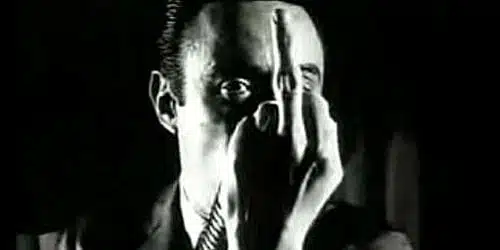
While reading How to Talk Dirty and Influence People, I grew to enjoy Lenny’s stream of conscience style, which becomes clear and concise by the end of the book (where he rants on about sex, religion and politics). Just when you think he has completely gone off subject, and maybe when you yourself have forgotten what he was originally writing about, he finds his way back. Chapter 27 on morality clauses come to mind; I might have to read it again:
“Recently I was offered a writing gig on a TV series (…). But after two days, negotiations went right into the can. The company’s legal department killed it. Because of the morality clause.
(…)
Since all moralists and purists support Las Vegas as the entertainment capital of the world, one would assume that the attraction at the Star Dust is The Passion Play or a Monet Exhibit or the New York City Ballet (…). But no; what is the big attraction?
‘Tits and ass.’
(…)
Well, that may be the truth but you just can’t have “tits and ass” up on a marquee.
‘Why not?’
Because it’s vulgar, that’s why.
(…)
Soon they will have just a big nipple up on the marquee, and maybe that’s why you want to have FOR ADULTS ONLY, because you’re ashamed to tell your kids that you are selling and exploiting and making an erotic thing out of your mother’s breast that gave you life. The morality clause.
And I really had wanted that job (…)”
He describes his formative years, in which he lived with relatives since his parents were divorced and where he had his first sexual experience by accidentally listening to relatives copulate without knowing he was in the room. He tell us how movies influenced his life and made him believe that everyone was but an ideal carbon copy of how people should be: “I credit the motion picture industry as the strongest environmental factor in molding the children of my day. (…) I learned there is no Judge Hardy, there is no Andrew, nobody has a mom like Fay Bainter. Oh God, the movies really did screw us up”.
His stay at a farm with an elderly couple he considered to be the family he never had shows us an uncanny need to belong, which would simmer down once he realized that for them he was just an employee. The time he served in the navy with Artie Shaw serves as an amusing anecdote since he never actually met him. It’s interesting to note that of his time in service, the only thing that matters to him is that he was in the same squadron as the man who married Lana Turner.
His start in show business with his mother was a turning point, as it is one of the few moments in the book where he shows a caring side for his family. His marriage to Honey, a stripper-singer, is as violent and bad-tempered as that of Bogart and Methot, with a lot of alcohol involved and a terrible car accident leading them to doom (Honey nearly died) – in spite of this, he tries his best to present her as a loving person, someone he respected quite a bit.
During his stunt as a religious con artist he actually stole priest uniforms and made quite a sum of money listening to bored housewives’ confessions, all of whom had been sexually abused in some way or another in their childhood (a clever use of irony?) – his Religion, Inc. stand-up probably used a lot of the material he gathered during this time. Lastly, we have his many scuffles with the law.
We can say Lenny scuffled his way through life due to his inability to conform to anything (whether this was pompous or irreverent is irrelevant), but his biggest enemy of all was the law. Ah, the law and Lenny Bruce. They definitely did not see eye to eye; Lenny’s comedic style was to talk to the audience as he would to his friends, and he could not be accused of having a clean mouth. I like to think he paved the way to freedom of speech through his many obscenity charges; if there are comics able to perform insanely jangled stand-ups today, it’s only because Bruce was there before them, willing to take on everything that was put on him in order to say what he wanted to say. It’s interesting to note his tenacity in fighting hypocrisy, questioning society values by illustrating how ridiculous they can be: “I don’t know about you, but I rather enjoy the way tax money is spent to arrest, indict, convict, imprison, parole and then re-parole (…). I’d just piss it away in beer anyway”.
He was also taken in by drug possessions several times, albeit in the book he tries his best to prove that those arrests were frame ups. Whether or not we should trust him on this remains open, as he is not exactly being reliable about what he is telling us. An example: he provides made-up accusations about George Bernard Shaw, stating in an interview that the famous author was once involved in the “Whorten incident”. Now, this accident was something that never occurred, but that put journalistic integrity up for questioning since the interviewer didn’t have the guts to admit he didn’t know what Bruce was talking about. If he were capable of teasing an interviewer just to prove a point, it wouldn’t surprise me if he did the same in his autobiography.
By the end of it all, Lenny felt like that odd friend you enjoy, but would never bring around to meet your parents – and what is more, he probably wouldn’t want to meet them either, anyway: “There is only what is. The what-should-be never did exist, but people keep trying to live up to it.”

